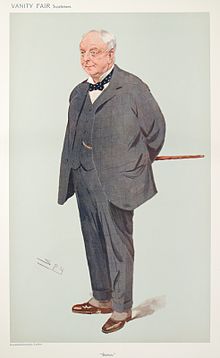Michael Bass, 1st Baron Burton
This article needs additional citations for verification. (March 2013) |



Michael Arthur Bass, 1st Baron Burton KCVO (12 November 1837 – 1 February 1909[1]), known as Sir Michael Bass, 1st Baronet, from 1882 to 1886, was a British brewer, Liberal politician and philanthropist. He sat in the House of Commons from 1865 to 1888 when he was raised to the peerage as Baron Burton.
Bass was born at Burton, the elder son of Michael Thomas Bass and the great-grandson of William Bass, the founder of the brewery firm of Bass & Co in Burton. His mother was Eliza Jane, daughter of Samuel Arden. Bass was educated at Burton Grammar School, Harrow and Trinity College, Cambridge.[2] He was a Director of the family firm of Bass, Ratcliff, Gretton and Co from 1863, and Chairman of the Directors upon his father’s death in 1884. He also sat as a Member of Parliament for Stafford from 1865 to 1868, for East Staffordshire from 1868 to 1885 and for Burton from 1885 to 1886. As a brewer, it was uncomfortable to be a Liberal MP as there was a strong temperance element to the Liberal party at the time.
In 1882 he was created a Baronet, of Stafford in the County of Stafford, chiefly in honour of his father (who was then still alive and who had declined every honour offered to him) and with remainder to his brother Hamar Alfred Bass. Four years later, in 1886, he was raised to the peerage as Baron Burton, of Rangemore and of Burton-on-Trent in the County of Stafford, with remainder to heirs male. In 1897 he was created Baron Burton, of Burton-on-Trent and of Rangemore in the County of Stafford, with remainder, in default of male issue, to his daughter and her male issue. In 1904 he was further honoured when he was made a Knight Commander of the Royal Victorian Order.
Lord Burton married Harriett Georgina, daughter of Edward Thornewill, in 1869. He died in London in February 1909, aged 71. He was succeeded in the baronetcy according to the special remainder by his nephew William while the barony of 1886 became extinct. The peerage of 1897 passed according to the special remainder to his daughter Nellie Lisa. Lady Burton died in 1931.
The Bass family seat was at Rangemore. King Edward VII visited Rangemore, the town and Bass Brewery in February 1902.
Like his father, Michael Arthur Bass was a generous benefactor to Burton, making many fine contributions to the town, including the Ferry Bridge Burton, the St Paul's Institute and Liberal Club (now the Town Hall) and St Chad’s Church. A bronze statue of Lord Burton, sculpted by F. W. Pomeroy, was erected in front of Burton Town Hall in 1911.
See also
References
- ^ http://www.freebmd.org.uk/ has his death in Q1, 1909, at St George's, Hanover Square, London. "BASS Michael Arthur [aged] 71 St Geo. H. Sq Vol.1a page 358"
- ^ "Bass, Michael Arthur (BS855MA)". A Cambridge Alumni Database. University of Cambridge.
- Kidd, Charles, Williamson, David (editors). Debrett's Peerage and Baronetage (1990 edition). New York: St Martin's Press, 1990.
- Leigh Rayment's Peerage Pages [self-published source] [better source needed]
- Leigh Rayment's Historical List of MPs
- www.thepeerage.com
External links
- 1837 births
- 1909 deaths
- People educated at Harrow School
- Alumni of Trinity College, Cambridge
- English businesspeople
- English brewers
- Baronets in the Baronetage of the United Kingdom
- Barons in the Peerage of the United Kingdom
- English philanthropists
- Knights Commander of the Royal Victorian Order
- Liberal Party (UK) MPs
- Members of the Parliament of the United Kingdom for English constituencies
- UK MPs 1865–68
- UK MPs 1868–74
- UK MPs 1874–80
- UK MPs 1880–85
- People from Burton upon Trent
